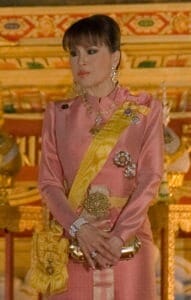The Constitutional Court has unanimously ordered the dissolution of the Thai Raksa Chart Party (TRC) for nominating Princess Ubolratana Rajakanya Sirivadhana Barnavadi as its prime ministerial candidate. The Constitutional Court did so by citing customary law. As a result of the party dissolution, the Constitutional Court decided 6-3 to ban TRC’s 14 executives from running in elections for 10 years. It also unanimously banned TRC’s executives from setting up parties or becoming executives of other parties for 10 years.

File photo of Princess Ubolratana Rajakanya Sirivadhana Barnavadi. Image: Wikipedia Commons
Earlier, the Thai Election Commission asked the Constitutional Court to dissolve the party after its nomination of Princess Ubolratana described as “antagonistic toward the constitutional monarchy”. The princess relinquished her royal titles in 1972 but is still officially treated as a senior member of the royal family, which is highly revered in Thailand, and protected by the draconian lèse-majesté law. However, within hours of Ubolratana’s nomination, King Vajiralongkorn, 66, deemed her candidacy “inappropriate”, effectively ending her brief political career. The king said in a royal communiqué on 8 February, “Involvement of a high-ranking member of the royal family in politics, in any way, is against the nation’s traditions, customs and culture and is therefore considered improper and highly inappropriate”.
Following the announcement of the Constitutional Court, Taweekiet Meenakanit, one of the nine judges, said, “The action also made Thai people feel that the monarchy, which is the heart of the Thai people, was brought down and used in a political game”. Thais see the judgment as politically motivated. Analytically, the judgment was primarily driven by the royal institution which continues to play an active role in Thai politics. The fact that the judgment was reached leads to the assumption that the Constitutional Court works for the benefits of the royal institution and not for the interests of the Thai people. In other words, the Constitutional Court is politicised, instigating doubts of the state of justice in Thailand.
Savagely Culling Political Rights and Freedoms
The judgment of the Constitutional Court is also interpreted as antagonistic toward the principle of democracy. The disruption of the Thai Raksa Chart Party savagely culls basic political rights and freedoms. The United Nations has published guidelines on the “Prohibition and Dissolution of Political Parties and Analogous Measures”, except in the event that such political parties incite violence as a means to overthrow a democratic system. The judgment of the Constitutional Court underlines the Thai authorities’ abuse of judicial power to restrict the peaceful association and expression of the political opposition. The Constitutional Court is not a friend of the people and democracy, but their enemy.

King Vajiralongkorn, 66, deemed Princess Ubolratana’s candidacy “inappropriate”, effectively ending her brief political career. Photo: Wikipedia Commons
The TRC is known to be associated with former prime minister Thaksin Shinawatra. Thaksin’s weight is also behind another party, the once ruling Pheu Thai Party. The dissolution of the TRC will affect the Pheu Thai party, undoubtedly. This is because the Pheu Thai is not fielding candidates in all constituencies and the TRC was expected to help fill that gap, part of a strategy to maximise votes for Thaksin’s allies.
Members of the defunct party now plan to encourage supporters to use the “vote no” option in ballots, which would require a rerun of polling in constituencies where the “no” option is the most popular. The Pheu Thai could then field candidates in those areas.
Thaksin or his supporters have won every election since 2001 only to be unseated either by force or the courts, part of a long tussle for power with the military and royalist elite. Thailand’s general election is due on 24 March after almost five years of military rule, with junta leader and former army chief Prayut Chan-o-cha seeking to return as premier.
Defending the Interests of the Elites
Should the pro-democracy forces win the elections, it would be a perilous situation running the country. Should they be able to run and prove to be politically strong, a coup would be possible. The end game is for the military to defend the interests of the elites. The elections, this time, are extremely crucial because Thailand has long been under the military rule. The last elections were held in 2011. They are also crucial because they will be the first under the new reign of Vajiralongkorn, the result of which will determine what kind of politics is desired by the king.
Pavin Chachavalpongpun
Pavin Chachavalpongpun, associate professor at the Center for Southeast Asian Studies, Kyoto University.
* Opinions expressed in this article are the author’s own and do not necessarily reflect FORSEA’s editorial stance.

